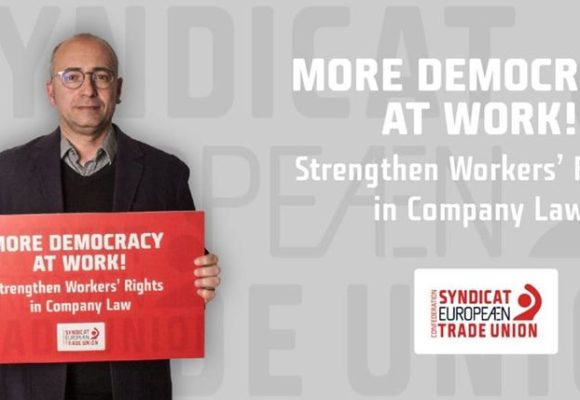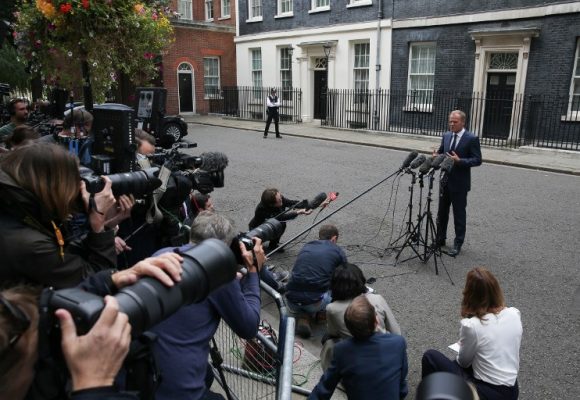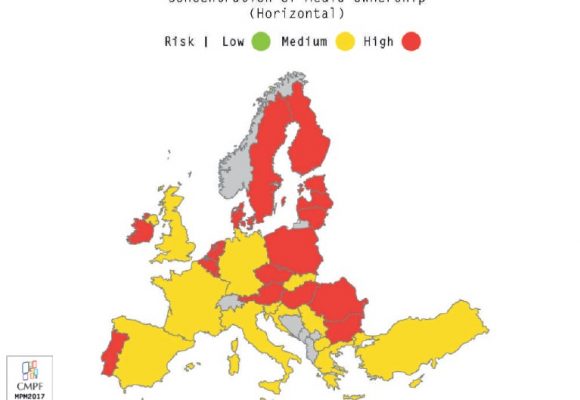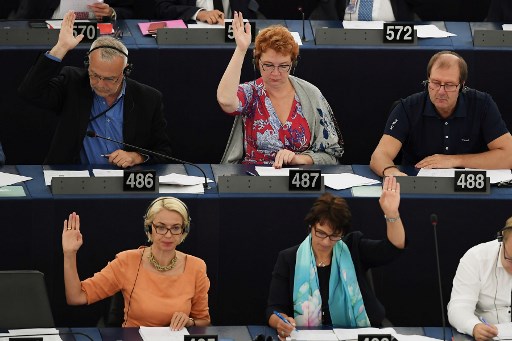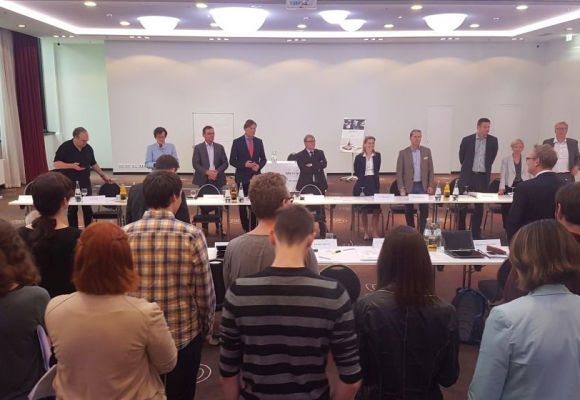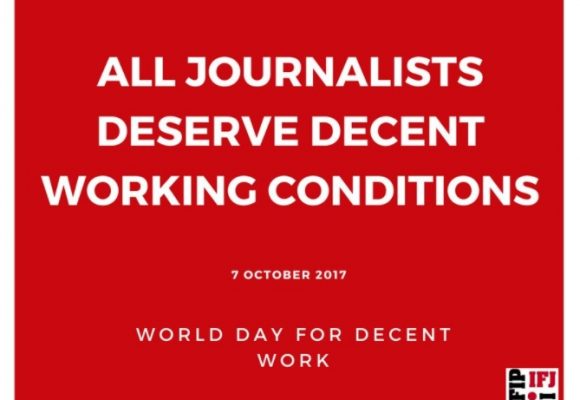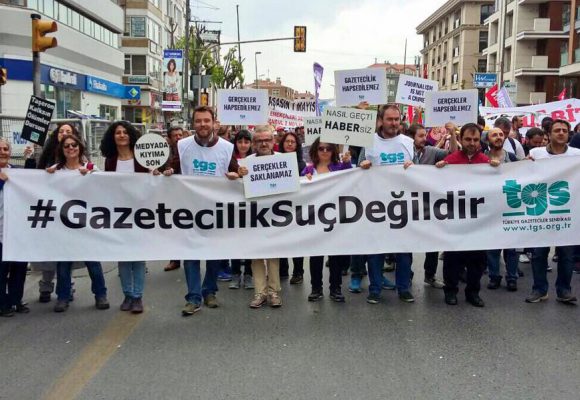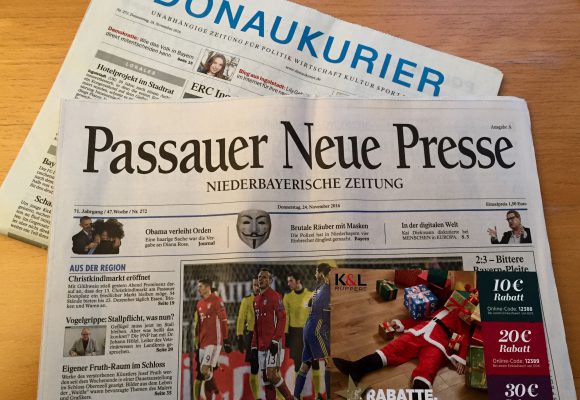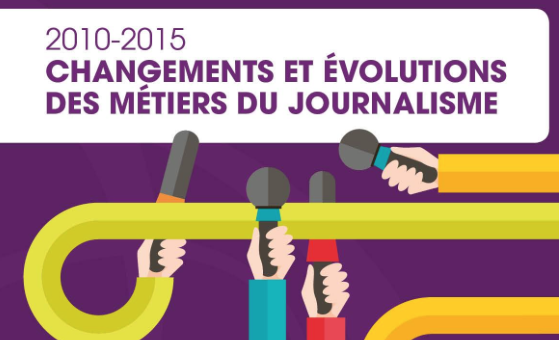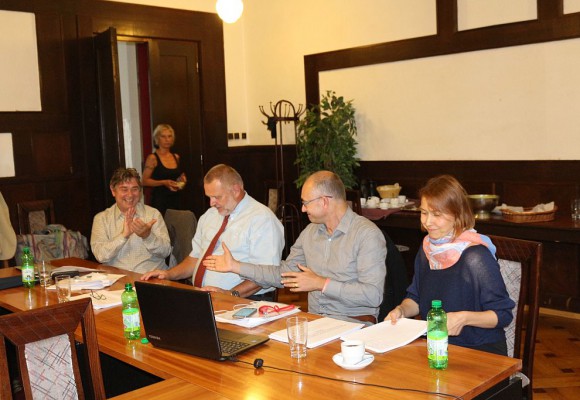#working conditions
EFJ welcomes scholars’ call for more democracy at work
The European Federation of Journalists (EFJ) welcomes the call by more than 3,000 scholars on 15 May for more democratisation of work. “Democratize firms; decommodify work; stop treating human beings as resources so that we can focus together on sustaining life on this planet,” concludes the call. “As a sectoral trade union federation, the EFJ supports the European Trade Uunion Confederation’s ongoing fight for the further democratisation of work, so we can only welcome this call for responsibility and mobilisation from the global scientific community,” reacted the EFJ General Secretary Ricardo Gutiérrez. “We fully agree with these prominent scholars: our…
In the UK and France, freelance journalists stand up for their rights to fairer, better and faster pay
Both in France and the UK, freelance media workers have joined forces to tackle the unlawful working practices of media owners. They demand the end of payment on publication, to be paid for all their work, not just on the basis of what has been published, only after it has been published. They also expect to receive payments promptly, instead of enduring huge delays and being left out of pocket. Media workers are under pressure from employers who are cutting editorial budgets, slashing jobs and undermining trade union organisations. Many journalists have been forced into what we call “fake freelance”…
Finnish trade union coalition demands more bargaining power for self-employed workers
On 20th November, a trade union coalition called Itset, representing self-employed workers, has published a list of goals to improve the situation of self-employed workers ahead of the Finish parliamentary elections in April 2019. Many unions, NGOs and other interest groups are now drafting and publishing their manifestos. Itset, who represents all three Finish trade union confederations including the Union of Journalists in Finland (UJF) , recognizes lack of fair compensation and contracts for freelancers, as well as the fact that the current legal definition of employment is too narrow. The European Federation of Journalists (EFJ) joins its affiliate, the UJF, in…
Risks for media pluralism and safety of journalists are increasing across Europe
The Media Pluralism Monitor (MPM) has examined 28 European Union Member States as well as three candidate countries: Turkey, Serbia and Macedonia. The results of this second EU-wide implementation of the MPM show either general stagnation or deterioration in all of the major areas encompassed by the MPM and confirm that no country analysed is free from risks to media pluralism. The Centre for Media Pluralism and Media Freedom (CMPF), based in Florence, has just published its 2017 Media Pluralism Monitor reports (#MPM2017). Year 2017 was marked by events that have had a significant impact on media freedom and media…
Sweden: Freelance fees recommendation will be increased in 2019
On November 12, the Swedish Union of Journalists (SJ) announced an increase of the recommended fees for freelances by 1.8 percent starting January 2019. The increase will concern also fixed freelance fees. This is to adjust the increased salaries by 1.8 percent accomplished through the recent collective agreement. The European Federation of Journalists (EFJ) supports its Swedish affiliate in this decision, recognizing that recommendations play a crucial role for many freelancers. Since the 1970s, the SUJ has issued recommended freelance rates per hour, equivalent to the average monthly wage of an employed journalist. This “freelance recommendation” consists partly in a recommended…
EFJ calls on MEPs to support TPWC Directive to protect workers’ rights
UPDATE (15.11.18): the European Parliament voted in favour of the Directive on Transparent and Predictable Working Conditions. Find more information here. The European Federation of Journalists (EFJ) has today called on Members of the European Parliament to support the draft Directive on Transparent and Predictable Working Conditions to protect the rights of precarious workers across Europe. On 15th November 2018, the Transparent and Predictable Working Conditions Directive will be voted in the European Parliament. The vote will determine whether the draft Directive can proceed to the next stage of the legislative process giving the European Parliament the mandate to negotiate on the position agreed…
Joint Declaration of trade unions and employers’ organisations of the EU Audiovisual Sector on Brexit
The Signatories in the Audiovisual Sector express their grave concern about the potential threat to the Audiovisual industry posed by Brexit. We call on the negotiators on both sides to ensure that the interests of the Audiovisual industry across the EU and the UK be protected in the current negotiations and in particular to give special consideration to the potentially very severe damage for their business operators and workers if the future framework for the cooperation between the EU and the UK Audiovisual sector are not adapted. More specifically: There are fears that, in the film and sector, important co-production…
Young journalists in Germany demand better pay for better journalism
A delegation of about 20 young German journalists together with the Deutscher Journalisten-Verband (DJV) and Deutsche Journalisten Union (dju in ver.di) met with publishers to demand better working conditions on 25 April 2018 in Berlin. They insisted that publishers have to invest in the future generation of journalists or the “generation Erasmus” will leave and with them the young topics that attract young readers. The European Federation of Journalists (EFJ) strongly supports the demands for investing in young journalists. This happened in the context of very difficult negotiations between the unions, DJV and dju in ver.di and the publishers association…
Steering Committee for the ETUC project “REBALANCE”
First meeting of the Steering Committee for the project “REBALANCE – Trade unions’ and social partners’ actions to improve reconciliation of work, family and private life for women and men”. Project Steering Members: – ETUC: Montserrat Mir, Cinzia Sechi, Mercedes Miletti, Kristian Bongelli – National members: Andreja Poje, ZSSS – Slovenia; Joa Bergold, LO – Sweden; Jessica van Ruitenburg, FNV – Netherlands; Christina Stockfish, DGB – Germany; Rosanna Ruscito, CISL – Italy; Pınar Özcan, HAK-IS – Turkey – European members: Ekaterina Efimenko, ETUCE; Myra Rednoss, IndustriALL; Amel Djemail, UNI; Inga-Lena Heinisch, ETF; Penny Clarke, EPSU; Kerstin Howald, EFFAT; Pamela Morinière,…
Today is the World Day for Decent Work!
Today is the World Day for Decent Work! A new survey from the International Federation of Journalists (IFJ) shows that unions have helped winning higher pay, saving jobs and securing new collective agreements over the past twelve months. The survey of 60 IFJ affiliates from every continent – released to coincide with World Day for Decent Work – shows that attacks on collective bargaining, low pay and a lack of rights for freelances are threatening to further undermine working conditions for journalists across the globe. A significant majority of unions surveyed highlighted a lack of collective bargaining, a lack of…
New report highlights the poor working conditions of BiH journalists
A Special report on the status and cases of threats against journalists in Bosnia and Herzegovina (BiH) was published on Monday 28 August 2017 by the Institution of Human Rights Ombudsman of BiH. The publication highlights the very bad employment status of journalists in the country, as well as the increase of violence, harassment and attacks against them. Some of the key findings highlighted in the report are: According to the BiH Journalists’ Association research, between 34% and 40% of journalists work in Bosnia and Herzegovina without adequate employment agreements, while those working with agreements are not sufficiently protected. Journalists…
Workers’ Day: Media Freedom requires decent working conditions for journalists
“There can be no press freedom if journalists exist in conditions of corruption, poverty or fear”… On this Workers’ Day, the European Federation of Journalists (EFJ) strongly encourage journalists to share the motto of the International Federation of Journalists (IFJ). Guaranteeing fair and decent working conditions to journalists is a precondition for media freedom. The study “Journalists under pressure” published on 20th April by the Council of Europe, based on a sample of 940 journalists reporting from 48 countries, shows that journalists in Europe are often exposed to serious pressure in their work, including intimidation and violence. As a consequence, many…
German journalists concern over media concentration due to newspapers takeover
Journalists and their unions in Germany expressed concerns over the sale of newspaper Donaukurier to the larger publishing house Passauer Neue Presse (PNP). The Bavarian Journalists’ Association, a member of the German Federation of Journalists (DJV) warned that the deal will result in further media concentration and uncertainty for the journalists working at both Donaukurier and PNP. In response to this development, the journalists’ unions in Germany including DJV, (dju) in ver.di and BJV will organise a protest on Saturday 24 November in the Passauer Fußgängerzone, Bahnhofstr. 2-4 (in the City Gallery). The European Federation of Journalists (EFJ) supports the action…
1 in 3 French journalists want to quit their job
Journalism seems to be no longer an attractive profession. At least, this seems to be the conclusion suggested by the survey “Evolution and changes in the journalism professions” carried out by the National Union of Journalists (SNJ) and the evaluation and prevention of occupational risks office Technologia. The study has analysed the evolution of journalism in France since 2010 and revealed that 34% of journalists respondents said they would quite the profession. The study is the follow-up of a first research “Actual journalists’ work, quality of information and democracy” launched in 2011 by the above organisations. The latest study showed three…
66% of Czech journalists are not unionised
Journalists’ unions in the Czech Republic should improve their recruitment policy. That’s one of the main conclusions of the EFJ-OSNPM survey on journalists’ working conditions in the Czech Republic. In the framework of the EFJ/IFJ Regional Development Fund, the European Federation of Journalists (EFJ), the Union of Journalists and Media Workers of the Czech Republic (OSNPM) and the Austrian union GPA-djp organised a survey to investigate the working conditions of Czech journalists and media workers. The online survey was launched on 19 May 2015. Around 2,500 journalists and media workers were invited to participate to the survey. Ricardo Gutiérrez, EFJ…
Why do they leave journalism?
“Why do they leave journalism?” – This is the question asked to 38 former journalists by journalism student Hélène Brédart in a project initiated at the Université de Liège and reproduced by Jean-François Dumont of the Belgian Association of Professional Journalists (AJP, member of EFJ). The results of the project published in the latest edition of the monthly Journalistes by the AJP show that the deteriorating working conditions and practices in journalism make are major reason why journalists left the profession. The most frequently mentioned reasons for journalists to leave their job are: • Increasing workload: The digital development and restructuring measures are putting…

